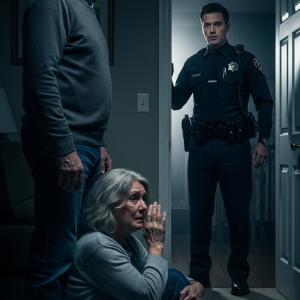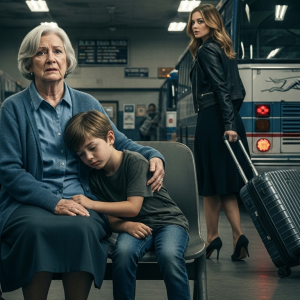The night air was a toxic cocktail of acrid smoke and chemical-laced steam. Flashing red and blue lights painted a macabre, strobing ballet across the faces of the displaced and terrified residents of the Golden Years Senior Living facility. Blankets were draped over shivering shoulders, but no amount of wool could stop the deep, rattling tremor of shock.
Jenna’s heart hammered against her ribs, a frantic drumbeat against the chaotic symphony of sirens and shouts. Her eyes scanned the crowd of wrinkled, soot-stained faces, searching for the one that had anchored her entire life. Panic, cold and sharp, clawed at her throat. “Grandma? Rose! Where are you?”
She pushed through the dazed crowd, her apologies swallowed by the noise. Then she saw her. Rose was sitting on the bumper of an ambulance, a paramedic trying to place an oxygen mask over her face. Her grandmother’s gaze was distant, fixed on the skeletal remains of the building as orange flames still licked at its blackened bones.
Relief hit Jenna with the force of a physical blow, her knees nearly buckling. She rushed to Rose’s side, her hands fluttering over her grandmother’s arms, checking for injuries. “Grandma, are you okay? Are you hurt?” Rose simply shook her head, her eyes wide and vacant, still trapped in the horror she had just escaped.
It was then that Jenna felt a small, insistent tug on the hem of her jacket. She looked down to see her six-year-old son, Leo, his face pale and smudged with ash, his eyes wide with a gravity far beyond his years. He leaned in close, his voice a tiny thread in the roaring tapestry of the disaster.
“He had a red can, Mommy,” Leo whispered, his breath warm against her ear. “Mr. Davis. I saw him take it into the storage shed. It smelled like when Daddy cuts the grass.”

Jenna froze, the world narrowing to that one, impossible statement. The lawnmower smell. Gasoline. She looked from her son’s earnest face to the inferno that had nearly claimed her grandmother, and a new, colder dread began to settle in her bones, far more terrifying than the fire itself
Jenna’s first instinct was to act. She found a uniformed police officer scribbling furiously on a notepad, his expression a mask of strained professionalism. She recounted Leo’s words, her voice trembling with a mixture of fear and conviction. “My son, he saw something. The manager, Davis, with a gas can.”
The officer barely looked up. He gave a tired, dismissive sigh, the kind reserved for hysterical witnesses and overwrought parents. “Ma’am, with all due respect, your son has been through a major trauma. It’s common for kids to get confused, to mix up memories.”
“He’s not confused!” Jenna insisted, her voice rising. “He was specific. He said it was Mr. Davis, just before the fire alarms went off.”
“And Mr. Davis has a verified alibi,” the officer said, his tone final. “He clocked out and was seen on traffic cameras on the other side of town when the first 911 call came in. We have to focus on the facts, ma’am. Right now, all signs point to an electrical fault in an old building.” He turned away, leaving Jenna standing in the cold, her words dissolving into the chaos.
Frustration and despair washed over her. She was brushed aside, her son’s crucial observation dismissed as childhood fantasy. As she turned back towards her family, a man stepped out from the shadows of a fire engine. He was in the heavy gear of a firefighter, but his helmet was off, revealing a face etched with a quiet, focused intensity.
“I overheard,” he said, his voice low and steady, cutting through the surrounding noise. “My name is Frank. I’m with the Fire Investigation Unit.” He guided her gently away from the main throng, his eyes never leaving hers. “Tell me exactly what your son said.”
Jenna repeated the story, this time to a listener who absorbed every word without a hint of skepticism. When she finished, a long, heavy silence hung between them. Frank’s gaze drifted to the smoldering ruin, a flicker of some deep, old pain in his eyes.
“I believe you,” he said, turning back to her. “And I believe your son. They called my father’s fire ‘faulty wiring,’ too.” The confession was stark, stripped of emotion, yet it carried the weight of years. “It was a different facility, five years ago. Another Golden Years property. He didn’t make it out.”
Jenna stared at him, understanding dawning like a terrible sunrise. This wasn’t a random encounter. This was fate.
“They have a pattern,” Frank continued, his voice hardening with resolve. “They let the places run down, the wiring get frayed, the sprinklers fail inspections. They create the perfect conditions for an ‘accident.’ But this time, a little boy saw a man with a can. And this time, I’m the one sifting through the ashes.”
The next day, the ruins of the nursing home were a monochromatic landscape of gray ash and blackened timber, cordoned off by yellow tape. Frank moved through the debris with a grim, practiced expertise. Armed with Leo’s whisper, he bypassed the main structure and focused his search on the collapsed storage shed.
Jenna sat in a nearby coffee shop with a pro-bono lawyer Frank had recommended, a sharp woman named Maria. As Frank searched, Maria gently prompted Jenna for any details, anything that seemed out of place in the months leading up to the fire. Jenna’s mind, spurred by the new, horrific context, began to connect the dots.
“The neglect was deliberate,” she said, the realization tasting like poison. “The air conditioning was always broken. In the middle of July, it was suffocating. The nurses complained, but management said there was no budget for a full repair.”
She remembered a conversation with Davis just a month prior, his words slick with a false sympathy that now seemed chillingly predatory. “He was talking about the property taxes,” Jenna recalled. “He smirked and said, ‘This land is wasted on old bricks. It’s insured for twice what it’s worth, you know. More valuable as an empty lot.'”
As she spoke, her phone buzzed. It was Frank. “Can you come back to the site? There’s something you need to see.”
Jenna and Maria arrived to find Frank kneeling in the wreckage of the shed. He wasn’t holding a melted gas can. He was holding a small, clear evidence bag. Inside were the charred, twisted remains of a small metal object and a piece of fused plastic. It looked like meaningless junk to Jenna.
“This isn’t just a timer,” Frank explained, his voice tight with a vindicated fury. “It’s the ghost of a device. A very specific, two-stage chemical ignition timer. It allows the arsonist to be miles away. The chemical catalyst creates a flash fire that burns hot enough to destroy almost everything, making it look like an electrical spark.”
He pulled out his own phone and showed her a picture from an old, cold case file. It was an evidence photo of an almost identical, partially melted device.
“From my father’s case,” Frank stated, his jaw tight. “The lab tech at the time thought it was part of a thermostat. It was dismissed. But I never forgot it.” This was it. The physical proof. The undeniable link that tied the two fires, two deaths, and one corrupt corporation together. The whisper had led them to the evidence that would scream the truth.
A private confrontation would be too small, too easily buried. Davis could be sacrificed, a lone scapegoat to protect the corporate entity behind him. Frank and Maria knew they had one shot to expose the entire rotten structure, and it couldn’t be in a courtroom. It had to be in the court of public opinion.
Three days later, Jenna stood at a podium in front of a ravenous pack of reporters. The glare of the camera lights was blinding. To her right stood Maria, calm and composed. To her left stood Frank, in his dress uniform, a silent, powerful symbol of authority and personal loss. Her hands trembled on the paper in front of her, but her voice, when she spoke, was clear and strong.
She began not with accusations, but with love. She spoke of Rose, of her resilience, of the community of residents whose lives were upended. Then, her tone shifted.
“The fire that destroyed the Golden Years facility was not an accident,” Jenna announced, the room falling silent. “It was a business decision. A line item on a profit and loss statement.”
A wave of murmurs and frantic typing filled the room.
“We have evidence that this tragedy is part of a predatory, systemic model of criminal negligence practiced by the parent corporation, Golden Years Senior Living,” Maria took over, her voice sharp and precise. She laid out the pattern: acquiring struggling nursing homes on valuable land, gutting their maintenance budgets, and then profiting from insurance payouts and real estate sales after a convenient “accident.”
Frank stepped forward, presenting the enlarged evidence photos of the two ignition devices side-by-side. “This is the device found at the site three days ago,” he said, pointing to one. “And this… is from the fire that killed my father five years ago. At another Golden Years property.”
The room erupted. Shouted questions, flashing cameras, the frenzy of a massive scandal breaking wide open. Jenna had not just accused a manager; with Frank and Maria’s help, she had declared war on an entire corporate empire on the six o’clock news. The whispers from the ashes had just become a deafening public roar.
The fallout was immediate and catastrophic. Davis, facing irrefutable evidence and the full weight of the state, confessed within hours, implicating the regional executives who gave him his orders. The press conference triggered a flood of calls to news stations and law firms from families of victims in other “accidental” fires at facilities across the country, all tracing back to Golden Years or one of its many shell corporations.
The FBI stepped in, and the corporate veil was torn to shreds. They uncovered a vast conspiracy of insurance fraud, racketeering, and criminal negligence. The CEO and his entire board were indicted. Their carefully constructed empire, built on the calculated neglect of the elderly, crumbled under the weight of their own greed.
Financially, Golden Years ceased to exist. They were hit with a class-action lawsuit so massive it dwarfed their assets. The insurance company they had defrauded for years sued them in return. Their stock became worthless overnight. The name “Golden Years” became a national synonym for corporate evil.
Months later, Jenna sat in her living room, a blanket wrapped around her and her grandmother’s shoulders. Leo was on the floor, building a tower of blocks, the quiet hero of a war he didn’t even know he had fought. On the television, a news anchor was discussing a new piece of federal legislation.
“The bill, informally dubbed ‘Rose’s Law’ by its supporters,” the anchor reported, “mandates stricter federal oversight and minimum safety standards for all senior care facilities, and is expected to be signed into law this week.”
Rose reached over and squeezed Jenna’s hand, a single tear tracing a clean path through the faint wrinkles on her cheek. The fight was over. The whispers of a six-year-old boy, amplified by the relentless love of a family and the dogged pursuit of a grieving son, had not just brought justice. They had brought change. They had torn down a corrupt dynasty and built a shield of safety for thousands of others, ensuring that new whispers of warning would never have to rise from the ashes again.
The media storm eventually subsided, replaced by the quiet, arduous process of rebuilding lives. Rose now lived with Jenna and Leo, her presence a constant, cherished reminder of what they had almost lost. The world hailed them as heroes, but in the silent hours of the night, victory felt less like a triumphant parade and more like a fragile truce with the ghosts of the past.
Jenna found herself living in a state of heightened alert. The pop of the toaster made her flinch. The distant wail of a siren sent a jolt of ice through her veins. She had become an accidental activist, her inbox overflowing with messages from strangers—some offering praise, others asking for help with their own battles against corporate negligence. She was a symbol of strength, yet she felt profoundly fragile.
“You’re the woman who brought down Golden Years,” a stranger had said to her in the grocery store, grabbing her hand with admiration. “You’re fearless.” Jenna had managed a weak smile, but inside she was screaming. She wasn’t fearless; she was terrified. Terrified that the world was full of other monsters hiding in plain sight.
Leo, too, carried the invisible scars. He had stopped drawing pictures of fire trucks and superheroes. His drawings were now of houses with many doors and windows, escape routes meticulously planned. One evening, as Jenna tucked him into bed, he looked at her with an unnerving seriousness.
“Mommy, did Mr. Davis have to go to the timeout place forever?” he asked, his small voice cutting through the quiet of the room.
Jenna’s heart ached. How could she explain the concepts of prison, of evil, of a justice that could never truly erase the harm done? “Yes, sweetie,” she said softly, stroking his hair. “He, and the other people who made bad choices, went to a place where they can’t hurt anyone ever again.”
Leo seemed to ponder this for a moment. “Good,” he finally whispered, turning over to sleep. “Because his smell is still in my nose sometimes.” Jenna sat by his bed for a long time after he fell asleep, the weight of his simple, profound statement pressing down on her. The fire was out, but the smoke still lingered in their memories.
Rose found a quiet solace in Jenna’s backyard garden. She would spend hours tending to the flowers, her hands, once frail, now finding purpose in the soil. But even here, among the vibrant life of roses and hydrangeas, the past was a constant companion. She would often pause, her gaze distant, her hands still.
One sunny afternoon, Jenna found her grandmother staring at a particularly beautiful yellow rose, her fingers tracing the edge of a photograph she held. It was an old, faded picture of her and another woman, both laughing, their arms linked.
“That’s Eleanor,” Rose said, her voice thick with unshed tears. “She adored yellow roses. She said they were like trapped sunshine.” Eleanor was one of Rose’s closest friends at the facility. She hadn’t survived the fire.
Jenna sat beside her on the small garden bench, placing a comforting hand on her back. “She would love what you’ve done with this garden, Grandma.”
Rose shook her head, a single tear escaping and tracing a path down her cheek. “Why me, Jenna? Why did I get to walk out when Eleanor… when so many others didn’t? Her room was right across the hall. Sometimes I think if I had just woken up a minute sooner, if I had just screamed louder…”
“Oh, Grandma, no,” Jenna whispered, pulling her into a hug. “You can’t do that to yourself. That is not your burden to carry.” But she knew the words were inadequate. They had won justice, but justice couldn’t resurrect the dead or heal the deep wound of survivor’s guilt. The garden was a place of new life, but it was also watered by memories of lives cut short.
A few weeks later, a thick envelope arrived in the mail. It had no return address, only Jenna’s name written in a neat, deliberate hand. Inside was a letter and a stack of newspaper clippings dating back seven years. The letter was from a man named Marcus Thorne.
“Dear Ms. Vance,” it began. “You don’t know me, but you and Fire Investigator Frank Ryland have given my family the first glimmer of hope we’ve had in seven years. My mother, Alice Thorne, died in a fire at the ‘Silver Creek Assisted Living’ facility. They called it a tragic accident, a frayed wire in a reading lamp.”
The clippings detailed the fire. The cause of death was listed as smoke inhalation. The facility, which was owned by a subsidiary of Golden Years, collected the insurance money and the property was sold six months later.
“I never believed it,” the letter continued. “My mother was meticulous. She unplugged everything. For years, I’ve been haunted, feeling that something was wrong, but I had no proof, no one to listen. Your press conference, the evidence you uncovered… it was like a key turning in a lock I thought was rusted shut. Because of you, the district attorney has agreed to reopen my mother’s case. You have given my mother’s memory a voice. Thank you.”
Jenna felt a profound, aching sense of connection. This was never just about Rose. It was about all the Roses, all the Eleanors, all the Alices.
She met Frank for coffee the next day and showed him the letter. He read it slowly, a solemn expression on his face. He looked up, his eyes holding a new, steely resolve.
“This is what’s next,” he said, his voice quiet but firm. “The state has put together a special task force to review dozens of cold cases just like this one, all linked to that corporate shell game. They’ve asked me to lead it.”
He looked out the window, not at the passing cars, but at something far away. “We put out the fire, Jenna. Now we have to help the other survivors who are still lost in the smoke.”
Jenna looked at the letter from Marcus Thorne, then at the determined face of the man who had turned his own tragedy into a weapon for justice. The scars on her own family were still healing, and perhaps they always would be. But for the first time, she understood that their whisper in the ashes hadn’t just ended a story of corruption; it had started a new one—a story of hope, of community, and of a light spreading to reach the other families who had been left in the dark for far too long.




